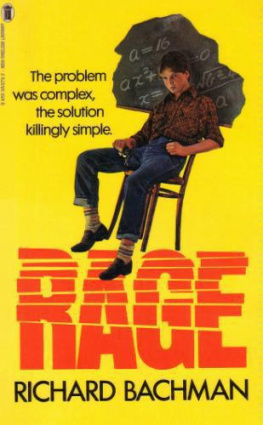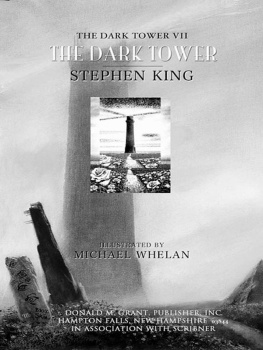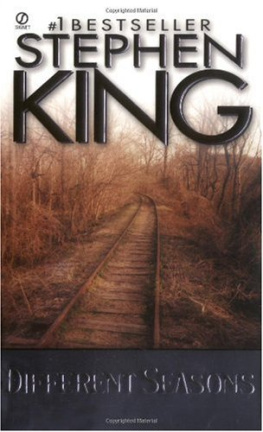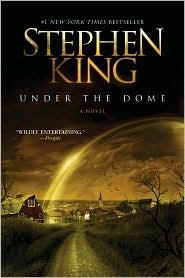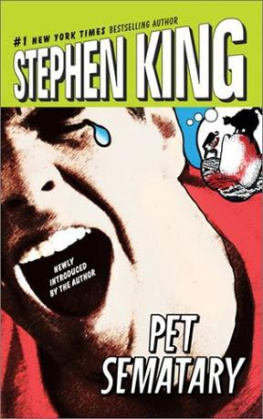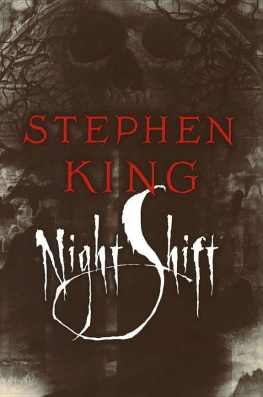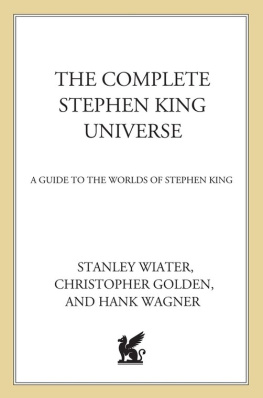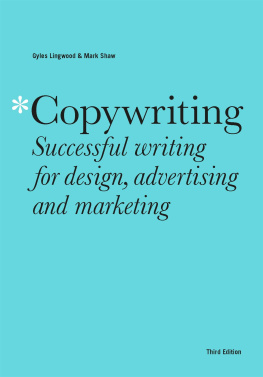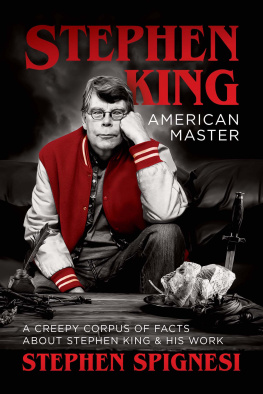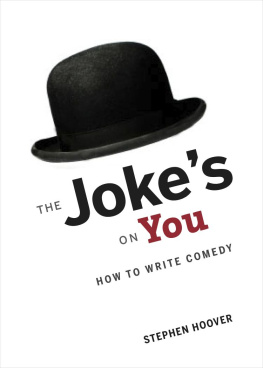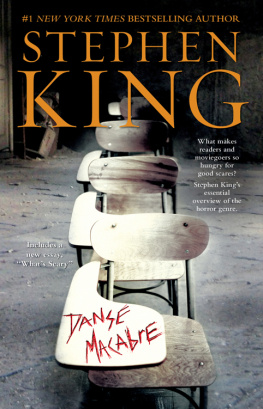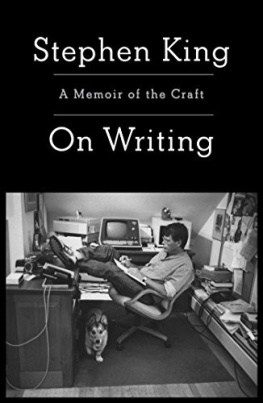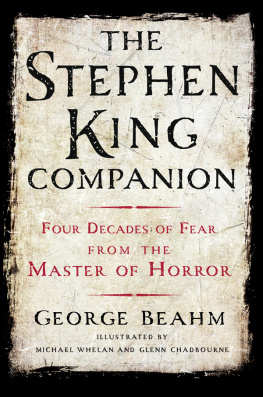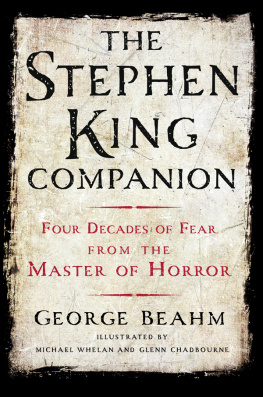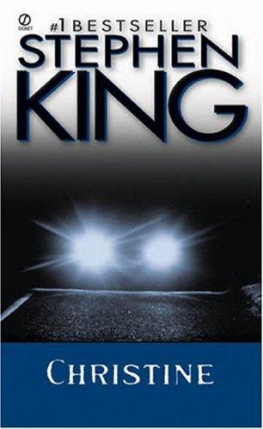Stephen King - On Writing: A Memoir Of The Craft
Here you can read online Stephen King - On Writing: A Memoir Of The Craft full text of the book (entire story) in english for free. Download pdf and epub, get meaning, cover and reviews about this ebook. year: 2000, publisher: Scribner, genre: Detective and thriller. Description of the work, (preface) as well as reviews are available. Best literature library LitArk.com created for fans of good reading and offers a wide selection of genres:
Romance novel
Science fiction
Adventure
Detective
Science
History
Home and family
Prose
Art
Politics
Computer
Non-fiction
Religion
Business
Children
Humor
Choose a favorite category and find really read worthwhile books. Enjoy immersion in the world of imagination, feel the emotions of the characters or learn something new for yourself, make an fascinating discovery.

- Book:On Writing: A Memoir Of The Craft
- Author:
- Publisher:Scribner
- Genre:
- Year:2000
- Rating:4 / 5
- Favourites:Add to favourites
- Your mark:
- 80
- 1
- 2
- 3
- 4
- 5
On Writing: A Memoir Of The Craft: summary, description and annotation
We offer to read an annotation, description, summary or preface (depends on what the author of the book "On Writing: A Memoir Of The Craft" wrote himself). If you haven't found the necessary information about the book — write in the comments, we will try to find it.
On Writing: A Memoir Of The Craft — read online for free the complete book (whole text) full work
Below is the text of the book, divided by pages. System saving the place of the last page read, allows you to conveniently read the book "On Writing: A Memoir Of The Craft" online for free, without having to search again every time where you left off. Put a bookmark, and you can go to the page where you finished reading at any time.
Font size:
Interval:
Bookmark:

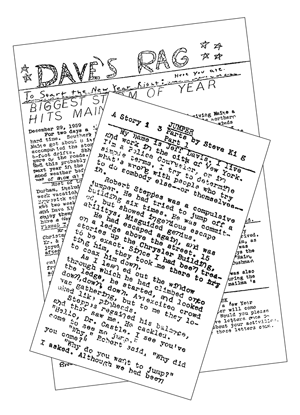
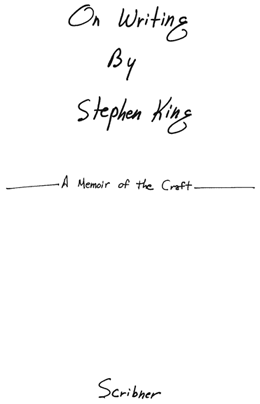

SCRIBNER
1230 Avenue of the Americas
New York, NY 10020
www.SimonandSchuster.com
Copyright 2000 by Stephen King
All rights reserved, including the right of reproduction in whole or in part in any form.
SCRIBNER and design are trademarks of Macmillan Library
Reference USA, Inc., used under license by Simon & Schuster, the publisher of this work.
DESIGNED BY ERICH HOBBING
Set in Garamond No. 3
Visit our website at:
www.SimonSays.com
ISBN 0-743-21153-7
eISBN: 978-0-743-21153-6
Unless otherwise attributed, all prose examples, both good and evil, were composed by the author.
There Is a Mountain words and music by Donovan Leitch. Copyright 1967 by Donovan (Music) Ltd. Administered by Peer International Corporation. Copyright renewed. International copyright secured. Used by permission. All rights reserved.
Granpa Was a Carpenter by John Prine Walden Music, Inc. (ASCAP).
All rights administered by WB Music Corp. All rights reserved. Used by permission. Warner Bros. Publications U.S. Inc., Miami, FL 33014.
Honestys the best policy.
Miguel de Cervantes
Liars prosper.
Anonymous
In the early nineties (it might have been 1992, but its hard to remember when youre having a good time) I joined a rock-and-roll band composed mostly of writers. The Rock Bottom Remainders were the brainchild of Kathi Kamen Goldmark, a book publicist and musician from San Francisco. The group included Dave Barry on lead guitar, Ridley Pearson on bass, Barbara Kingsolver on keyboards, Robert Fulghum on mandolin, and me on rhythm guitar. There was also a trio of chick singers, la the Dixie Cups, made up (usually) of Kathi, Tad Bartimus, and Amy Tan.
The group was intended as a one-shot dealwe would play two shows at the American Booksellers Convention, get a few laughs, recapture our misspent youth for three or four hours, then go our separate ways.
It didnt happen that way, because the group never quite broke up. We found that we liked playing together too much to quit, and with a couple of ringer musicians on sax and drums (plus, in the early days, our musical guru, Al Kooper, at the heart of the group), we sounded pretty good. Youd pay to hear us. Not a lot, not U2 or E Street Band prices, but maybe what the oldtimers call roadhouse money. We took the group on tour, wrote a book about it (my wife took the photos and danced whenever the spirit took her, which was quite often), and continue to play now and then, sometimes as The Remainders, sometimes as Raymond Burrs Legs. The personnel comes and goescolumnist Mitch Albom has replaced Barbara on keyboards, and Al doesnt play with the group anymore cause he and Kathi dont get alongbut the core has remained Kathi, Amy, Ridley, Dave, Mitch Albom, and me plus Josh Kelly on drums and Erasmo Paolo on sax.
We do it for the music, but we also do it for the companionship. We like each other, and we like having a chance to talk sometimes about the real job, the day job people are always telling us not to quit. We are writers, and we never ask one another where we get our ideas; we know we dont know.
One night while we were eating Chinese before a gig in Miami Beach, I asked Amy if there was any one question she was never asked during the Q-and-A that follows almost every writers talkthat question you never get to answer when youre standing in front of a group of author-struck fans and pretending you dont put your pants on one leg at a time like everyone else. Amy paused, thinking it over very carefully, and then said: No one ever asks about the language.
I owe an immense debt of gratitude to her for saying that. I had been playing with the idea of writing a little book about writing for a year or more at that time, but had held back because I didnt trust my own motivationswhy did I want to write about writing? What made me think I had anything worth saying?
The easy answer is that someone who has sold as many books of fiction as I have must have something worthwhile to say about writing it, but the easy answer isnt always the truth. Colonel Sanders sold a hell of a lot of fried chicken, but Im not sure anyone wants to know how he made it. If I was going to be presumptuous enough to tell people how to write, I felt there had to be a better reason than my popular success. Put another way, I didnt want to write a book, even a short one like this, that would leave me feeling like either a literary gas-bag or a transcendental asshole. There are enough of those booksand those writerson the market already, thanks.
But Amy was right: nobody ever asks about the language. They ask the DeLillos and the Updikes and the Styrons, but they dont ask popular novelists. Yet many of us proles also care about the language, in our humble way, and care passionately about the art and craft of telling stories on paper. What follows is an attempt to put down, briefly and simply, how I came to the craft, what I know about it now, and how its done. Its about the day job; its about the language.
This book is dedicated to Amy Tan, who told me in a very simple and direct way that it was okay to write it.
Second Foreword
This is a short book because most books about writing are filled with bullshit. Fiction writers, present company included, dont understand very much about what they donot why it works when its good, not why it doesnt when its bad. I figured the shorter the book, the less the bullshit.
One notable exception to the bullshit rule is The Elements of Style, by William Strunk Jr. and E. B. White. There is little or no detectable bullshit in that book. (Of course its short; at eighty-five pages its much shorter than this one.) Ill tell you right now that every aspiring writer should read The Elements of Style. Rule 17 in the chapter titled Principles of Composition is Omit needless words. I will try to do that here.
Third Foreword
One rule of the road not directly stated elsewhere in this book: The editor is always right. The corollary is that no writer will take all of his or her editors advice; for all have sinned and fallen short of editorial perfection. Put another way, to write is human, to edit is divine. Chuck Verrill edited this book, as he has so many of my novels. And as usual, Chuck, you were divine.
Steve
C.V.
I was stunned by Mary Karrs memoir, The Liars Club. Not just by its ferocity, its beauty, and by her delightful grasp of the vernacular, but by its totalityshe is a woman who remembers everything about her early years.
Im not that way. I lived an odd, herky-jerky childhood, raised by a single parent who moved around a lot in my earliest years and whoI am not completely sure of thismay have farmed my brother and me out to one of her sisters for awhile because she was economically or emotionally unable to cope with us for a time. Perhaps she was only chasing our father, who piled up all sorts of bills and then did a runout when I was two and my brother David was four. If so, she never succeeded in finding him. My mom, Nellie Ruth Pills-bury King, was one of Americas early liberated women, but not by choice.
Font size:
Interval:
Bookmark:
Similar books «On Writing: A Memoir Of The Craft»
Look at similar books to On Writing: A Memoir Of The Craft. We have selected literature similar in name and meaning in the hope of providing readers with more options to find new, interesting, not yet read works.
Discussion, reviews of the book On Writing: A Memoir Of The Craft and just readers' own opinions. Leave your comments, write what you think about the work, its meaning or the main characters. Specify what exactly you liked and what you didn't like, and why you think so.

